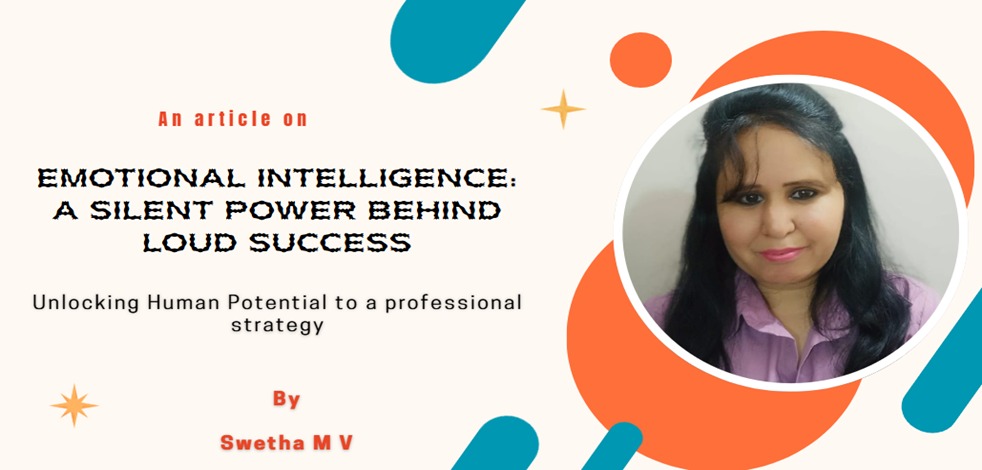The Game-Changer in Personal and Professional Success In the evolving landscape of the workplace and society, technical skills can open doors—but it is emotional intelligence that keeps those doors open. As a soft skills trainer, I have seen firsthand that it’s not always the most intellectually brilliant individuals who succeed. More often, it’s those who are emotionally intelligent, capable of managing themselves and understanding others with empathy and balance.
What is Emotional Intelligence?
It is the ability to recognize, understand, manage, and influence one’s own emotions as well as those of others. Psychologist Daniel Goleman, who popularized the term, breaks it down into five core components:
- Self-awareness
- Self-regulation
- Motivation
- Empathy
- Social skills
Why Emotional Intelligence Matters?
In a world where collaboration, conflict resolution, and communication are essential, emotional intelligence plays a pivotal role. Let’s understand how:
- Enhances Self-Awareness:
Self-awareness is the foundation of emotional intelligence. It means being in tune with your emotions, triggers, strengths, and blind spots. A self-aware individual doesn’t just react—they respond with intention.
For instance, a leader who notices their rising frustration in a tense meeting can take a pause, choose their words carefully, and maintain composure. This calm presence inspires trust and reduces team anxiety.
- Strengthens Relationships:
People with high EI are skilled at reading others’ emotions, which allows for deeper, more meaningful relationships. They listen actively, validate others’ feelings, and communicate with empathy. Whether in personal life or professional teams, emotionally intelligent individuals foster harmony.
- Facilitates Better Communication:
Words carry power, but it’s emotions that give them meaning. Someone with high EQ knows how to tailor their message—not just what to say, but how to say it. They avoid passive aggression, respond rather than react, and use assertiveness to express their needs respectfully.
- Improves Decision-Making:
Contrary to popular belief, emotions are not the enemy of logic—they are essential guides. Emotional intelligence helps us balance intuition with rationality. A manager who senses team burnout can adjust timelines or workloads before a crisis unfolds. Emotional data becomes a part of strategic planning.
- Builds Resilience and Adaptability:
Life throws curveballs. People with strong emotional intelligence bounce back quicker from setbacks. They view failure as feedback, not defeat. They regulate anxiety, stay optimistic, and adapt with grace—making them valuable assets in dynamic work environments.
- Drives Leadership Excellence:
Leadership is not about control—it’s about influence. Emotionally intelligent leaders inspire rather than intimidate, coach rather than command. They read the emotional pulse of their teams, provide psychological safety, and empower others to thrive.
Practical Ways to Develop Emotional Intelligence:
- Emotional intelligence is not fixed—it can be cultivated with practice. Here are some actionable ways to enhance EQ
- Practice Mindfulness: Spend a few minutes daily observing your thoughts and emotions without judgment. This builds self-awareness.
- Label Emotions: Instead of saying, “I feel bad,” identify the precise emotion—“I feel frustrated,” “overwhelmed,” or “disappointed.” Naming emotions helps in managing them.
- Pause Before Reacting: Introduce a moment of silence before responding in emotionally charged situations. It breaks the automatic reaction cycle.
- Listen to Understand: Don’t just hear—listen. Ask questions, paraphrase what the other person says, and reflect feelings.
- Seek Feedback: Ask trusted peers or mentors how you come across emotionally. It opens blind spots and fosters growth.
- Empathy Mapping: Put yourself in someone else’s shoes. What might they be thinking, feeling, fearing, or needing?
- Stay Curious, Not Critical: When you notice a strong emotional response (in yourself or others), replace judgment with curiosity.

EI in the Workplace: A Strategic Asset:
In today’s diverse and multicultural workspaces, emotional intelligence is not optional—it’s essential. Studies show that 90% of top performers have high emotional intelligence. It impacts everything from team performance, conflict management, employee retention, to customer satisfaction.
A customer service executive who handles an irate client with calm and empathy saves a relationship that could have been lost. A project manager who motivates a demoralized team during tough deadlines gets the job done without burnout. These are not just soft skills—they are power skills.
Final Thoughts:
In a world driven by automation and artificial intelligence, what sets us apart is emotional intelligence. It is the soul of communication, the anchor during stress, and the bridge between people. Whether you’re a student, a team leader, or a CEO—developing emotional intelligence is not just a personal transformation; it’s a professional strategy.
Let us not underestimate the quiet strength of understanding emotions—because people may forget what you said, but they will never forget how you made them feel.





Leave a Reply